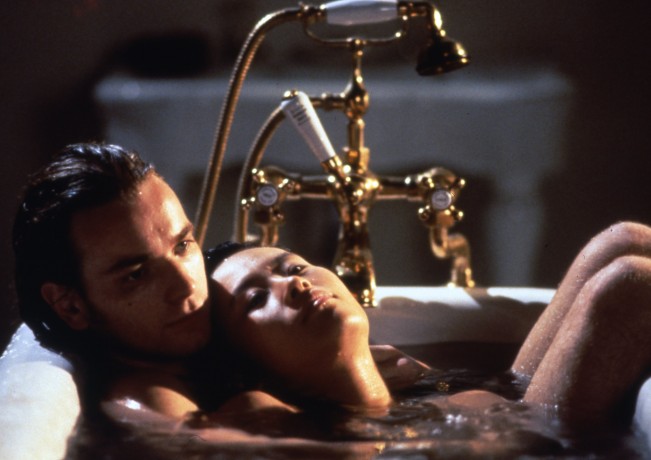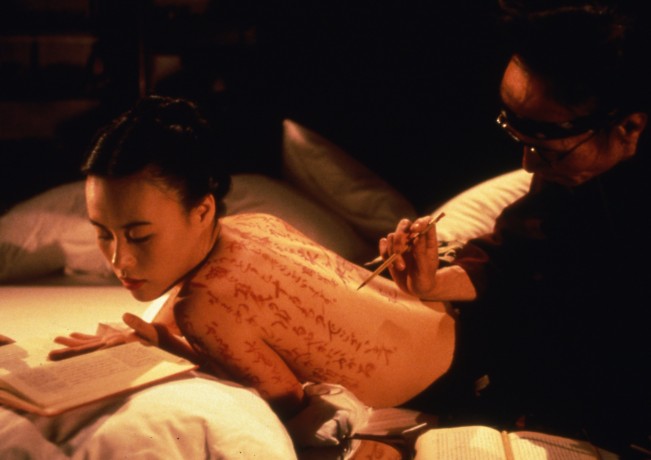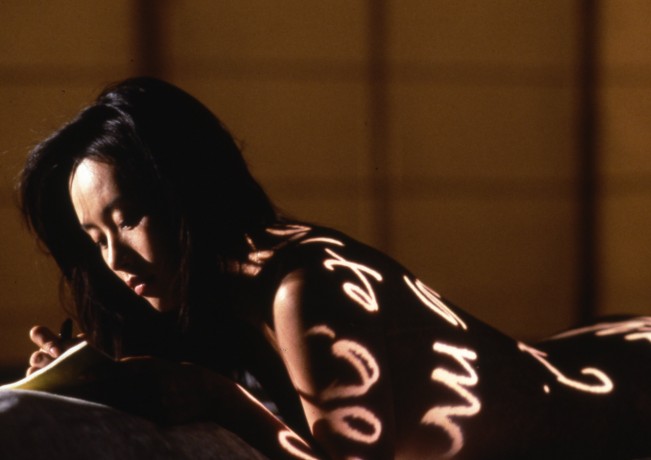Movie City Indie Archive for June, 2015
Sheffield Doc/Fest’s Joshua Oppenheimer Masterclass 1″12’47”
André Gregory and Wallace Shawn Talk with Fran Lebowitz (3’29”)
Peter Greenaway talks “Pillow Book” (from the 20th century)

There’s a restored, remastered version of Peter Greenaway’s ravishingly photographed 1995 The Pillow Book out now, with an amusingly Greenawayesque feature-length commentary by Greenaway on the Blu-ray and DVD, as well as an astute essay by Nicolas Rapold. The Film Comment senior editor writes: “For Greenaway, his film addresses his oft-voiced complaints about cinema’s identity and about the hierarchy of text and images. It’s as if their unity through the human bodies of The Pillow Book represented some tactile reconciliation, as Greenaway looks beyond his beloved Western canon of painting, architecture and literature, and for a change, toward an eastern work whose insights and abandonment of convention were evidently a creative tonic.”
I talked to Greenaway when the film was released, in a discursive two hours one Sunday afternoon after a recondite, cheekily abstruse Saturday night lecture to an audience of mostly elderly Chicago arts types. (I wonder where the cassettes of that conversation are.) I started by asking him not to repeat any of the dense, allusive, even elusive material from the night before: could we course the conversation along other limits: cartography, the topography of a city like Hong Kong, the making of lists upon lists, inscription upon the skin, men’s fashion (as evidenced in the Paul Smith and agnes b. costumes that Ewan McGregor shoulders on)? He warmed to the limits. Here’s that interview, lightly edited, but not updated. [June 9, Film Movement Classics.]
THERE ARE NEVER ENOUGH SCREENS FOR PETER GREENAWAY. Not the single screens his films such as The Pillow Book play on in only the larger cities of this country, but the blocks of information, layers of detail, of flash and filigree that burst like fireworks in his work atop ever more screens of narrative strategy, emotional distance, art-historical allusion and personal symbolism. Greenaway chuckles that the CD-ROM was invented just for him, with its potential for creating an infernal thicket of reference and cross-reference at each and every viewing.
The startling and perverse The Pillow Book is an adaptation of the thousand-year-old “Pillow Book of Sei Shonagon,” a diary of lovers’ stories, of sexual manners, of longings and regret, compiled by a lady-in-waiting to the Japanese Imperial court. Greenaway fashions his most elegant and compelling film in years, following Vivian Wu as a model in contemporary Hong Kong, who dreams of embodying the erotic fantasies of Shonagon by writing stories on the bodies of her lovers in ornate calligraphy. The combination of visual styles is dazzling—black-and-white memories in the style of Yasujiro Ozu’s movies about family life; brightly colored scenes of street life and fashion shows, of lovemaking and revenge-getting, in varying screen widths and with frames superimposed within frames; and in one memorable scene, inspired by Karaoke, a French pop song accompanying a lovers’ montage, subtitled in English and French with subtitles in calligraphy. Ewan McGregor is also at hand, offering a largely nude performance as Wu’s ultimate blank screen, the body she has dreamed of writing her erotic fantasies upon.
In public appearances, the perennially black-clad painter-writer-director is given to lengthy pronouncements, and even in the more-relaxed confines of an interview, his digressions and assertions are difficult to break down to less than hefty paragraphs. The lasting pleasures of the 55-year-old Greenaway’s movies are seldom simply those of narrative, but of found references, chance juxtapositions, painterly eruptions, moments that privilege the viewer in unexpected ways.
 But some audiences are resistant to the challenges Greenaway’s work offers. “People are conditioned to believe in certain things and it’s extremely difficult to maneuver them out of the particular paths,” the self-described “intellectual exhibitionist” says. “They feel that film should massage their prejudices and confirm what they already know. I often feel that we talk and we talk and we talk and people appear to hear but they don’t listen. Well, I think it’s going to have to be a Japanese water-torture form of education. I hope to entertain on as many levels as possible at once, even hundreds. We’re just going to have to keep going and keep going and hope at least sixty percent of what we’re trying to say can come through. There are so many characteristics which I find abhorrent about cinema. It’s over a hundred years old and no one has begun to truly explore its potential yet.”
But some audiences are resistant to the challenges Greenaway’s work offers. “People are conditioned to believe in certain things and it’s extremely difficult to maneuver them out of the particular paths,” the self-described “intellectual exhibitionist” says. “They feel that film should massage their prejudices and confirm what they already know. I often feel that we talk and we talk and we talk and people appear to hear but they don’t listen. Well, I think it’s going to have to be a Japanese water-torture form of education. I hope to entertain on as many levels as possible at once, even hundreds. We’re just going to have to keep going and keep going and hope at least sixty percent of what we’re trying to say can come through. There are so many characteristics which I find abhorrent about cinema. It’s over a hundred years old and no one has begun to truly explore its potential yet.”
Greenaway is notorious for the number of potential projects he has planned, and for the wealth of sketches and writing that accompanies each. “Oh yes, my career is scattered and littered with hundreds and hundreds of productions, started and abandoned, thought about and moved on.” He finds the exigencies of a film’s budget and shooting schedule a boon to getting anything done. “A writer, or a painter, working on a private basis, the conditions would be even more deplorable. The responsibilities of time and collaborators creates a series of strictures that push you on. Unless those didn’t exist, to push it further there would be no reason to get out of bed in the morning! I would simply sit in bed and write scripts.”
 Is there a lot of toil and drudgery in assembling all this information? “It’s not drudgery. It is a sheer and dangerous delight. I like committing the ideas to the actual written page as much as I despise the notion that we have to have a text before we have image. The majority of drama scripts are dialogue lists and banal as literature. But my scripts are very, very full of lots and lots of information. I want to make them readable. Yet in terms of the actual mechanics of putting the thing down, I never start at the beginning. I pursue some detail and then ripple out.”
Is there a lot of toil and drudgery in assembling all this information? “It’s not drudgery. It is a sheer and dangerous delight. I like committing the ideas to the actual written page as much as I despise the notion that we have to have a text before we have image. The majority of drama scripts are dialogue lists and banal as literature. But my scripts are very, very full of lots and lots of information. I want to make them readable. Yet in terms of the actual mechanics of putting the thing down, I never start at the beginning. I pursue some detail and then ripple out.”
A suitable choice of words, considering how water and the shadows of ripples suffuse The Pillow Book. Hong Kong is shown as a sum of urban delirium and dissociation, then the ripple of watery reflection plays off almost all of the miraculous, unaffordable dream decors of homes and cafés and restaurants. Even fire is photographed with the rippling caress of water. “There are certain visual motifs that I quite flagrantly am prepared to use over and over again,” he says, “such as flight and the notion of water.”
Greenaway slouches a little, revealing unexpected plumage in the fashion of fire-engine-red suspenders under his black carapace. “Water is so photogenic and powerfully metaphorical in many ways. The sheer delight of photographing water! When I find the space somewhere in a film, I have the sheer self-indulgence to bring it in. I have to find a rationale to make the scenes significant in their context. It’s something we learned from Godard. He would show us something: ‘Here, take a look here at this for a moment.’ But it also goes back to Laurence Sterne and ‘Tristam Shandy.’ What is so brilliant about that book is that easy, relaxed conversational way to embrace anything you want to embrace and still make it work. It’s terrible that audiences are so conditioned to want to be told a story in that ever-anxious, dominant cinema way. When everything has to be germane to plot, we all miss so much.”
[Originally published in Newcity in a slightly different form in 1996.]
“Flying Saucer Attack” by Peter Strickland for Instrumental 7 (7’44”)
Mr. Strickland’s first music video, for a band who contributed music to Duke Of Burgundy.











